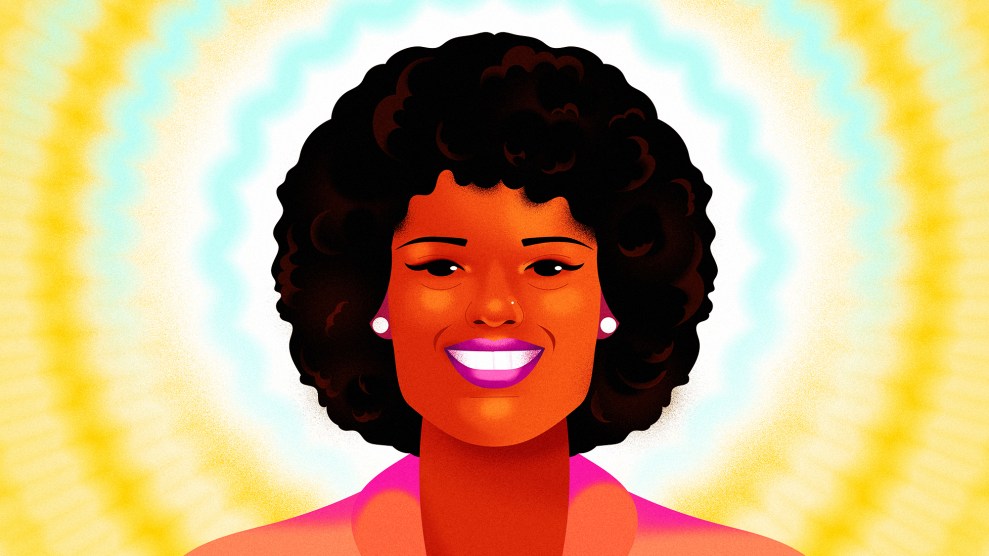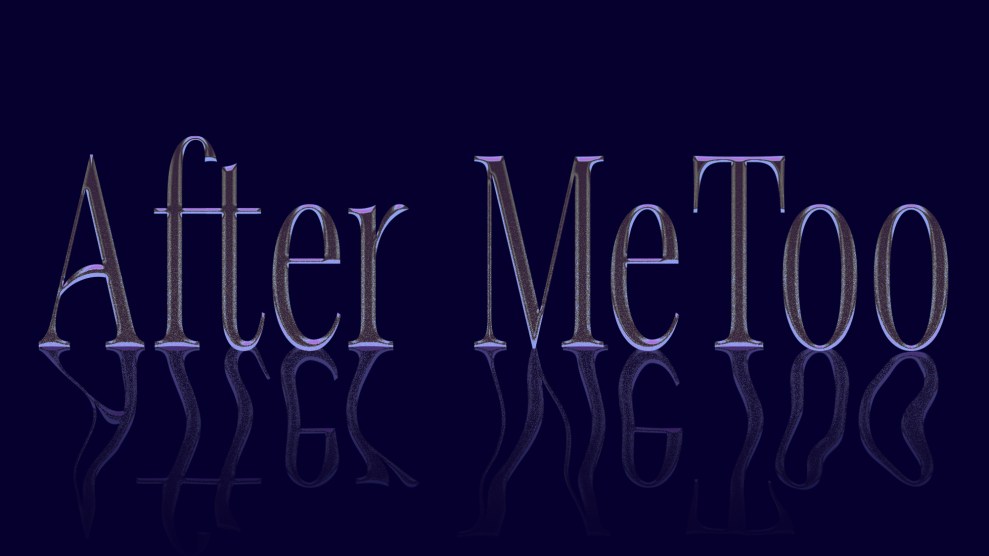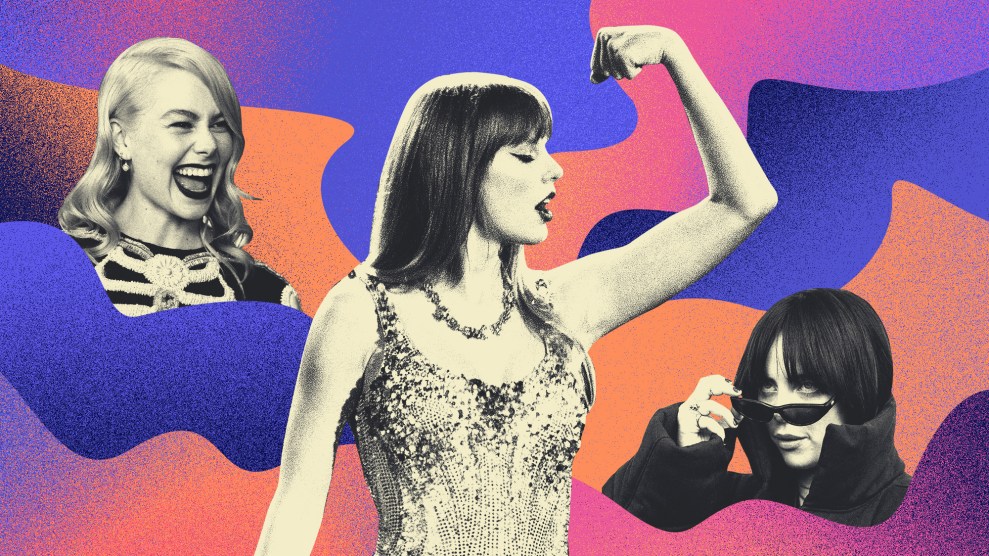More than five years ago, the MeToo movement exploded and our culture shifted. But what actually changed? This project seeks to reexamine the era by asking how it will alter the lives of the next generation.
Last fall, Olivia Krupp, a student journalist at the University of Arizona’s newspaper, The Daily Wildcat, wrote a profile of campus TikTok influencer Lukas Pakter, whose videos give advice on topics like fitness and relationships to his largely young male audience. Krupp was prepared for some pushback on the story, which criticized Pakter for espousing a brand of toxic masculinity his own followers compared to that of the infamously misogynistic influencer Andrew Tate. But she never expected the torrent of harassing and threatening messages she received in response to the piece—so many that she drew media coverage from major outlets like the Washington Post. (Pakter did not respond to a request for comment from Mother Jones, but told a local news station that he did not condone harassment or threats of violence and had made a video condemning the attacks. A University of Arizona representative said school officials were not available to respond to a request for comment.)
In my freshman year, when I joined the student newspaper, I was just trying to get a feel for it. At the time, I thought this would be easy. I’m a really opinionated person and I have a lot of ideas and stories I want to write.
I decided to profile Lukas Pakter in my sophomore year, because my friends and I would constantly see his videos on TikTok. He was a senior at the University of Arizona and a former fraternity president with more than 100,000 followers. His videos ranged from fitness content to digestible motivational tidbits to just flexing in front of his phone. He also had Q&A videos where he answered anonymous messages from people asking him questions about how to deal with social anxiety, breakups, and even substance abuse. He presented himself as someone who is provocative and bold—in one video, he said he had very little respect for people who were “morbidly obese.” But what was really so controversial about a fraternity kid being cocky? His content seemed like a big joke, to be honest.
When I interviewed him in late August last year, I told him I wanted this to be conversation about his platform and his life. I didn’t even know what I wanted the story to be about until I interviewed him. I just thought this is someone who would be an interesting person to talk to, someone who’s relevant to campus life, and it’ll probably make a good story.
He seemed just like a regular guy. He described himself as a “loser” when he was a kid, and said that he had no friends. He was happy to talk about himself, and he was perfectly nice. I asked him questions like, “Do you think there’s any validity to the term ‘alpha male’?” He told me he personally could tell if someone was an alpha within seconds of meeting them—it’s not about looks, he told me, it’s about the energy a person puts out.
Pakter encouraged guys to embrace their masculinity, but he was also openly vulnerable on TikTok. People respected that. He transformed from a self-described “loser” into what I called him in my piece, a hypermasculine gym bro whose fanboys believed he got hot chicks left and right. But all of that was an empty promise for the young men who watch his videos, telling them they can stop being a loser too if they do this or that. Young men do have a lot of trouble finding positive role models, and Pakter seems to help fill a void. He told me lots of guys don’t want to talk about their problems because they don’t want to come off as vulnerable, and Pakter makes these videos to help with that.
What I found problematic, and what I wrote about, were some of his other points. He’s said that the primary role of a man is to be the protector, and that’s something men should be proud of. Other videos describe “untouched” women as preferable to those who have high “body counts.” His followers have compared him to Andrew Tate, to which he’s said that he has “nothing against” him—sure he’s a misogynist, which is “unfortunate,” but he respects Tate’s honesty and motivational skills.
I basically warned him, this piece isn’t really about you as much as it is about the implications of what you’re posting: the comments about women and fat people, and his followers comparing him to Andrew Tate, and the similarities between both their young male fans. The young men who are growing up to be fathers, in the next 20 to 30 years, consuming media like this, that’s just unbelievable content to be taking in when so many of them are as young as 14 years old right now.
The piece itself was really hard to write, but I knew that I wanted to write a story where I didn’t have to say much of anything for his message to be clear. I didn’t have a personal agenda with him specifically. I had an agenda to address the problems faced by young men. And that’s way bigger than Lukas Pakter.
On the day the final piece went up, I was on the treadmill, and my phone was blowing up with calls. I’m thinking, Is this a prank? Is someone prank-calling me? It was just a crazy amount of calls. I briefly thought something had happened to a family member.
When I answered the phone, it was just some guy who yelled, “Fuck you, bitch, you fucking whore.”
I immediately hung up, and I thought, I have to check TikTok right now. And I see this 2-minute-long video of Lukas Pakter, in front of a screenshot of my personal Instagram, and it’s just him saying this girl wrote a hit piece about me. He puts a picture of my Instagram up and then he shares texts between us, and my number is right there in the video. He doesn’t make any effort to cover it up at all. He ends the video with a full screenshot of my Instagram and says, “You wanted your quick easy rise to fame, I’m handing it to you right here…I have absolutely no respect for you. I think you’re a scumbag, and we’ll see what happens next.”
He posts the video, and my phone and Instagram became flooded with messages. I’ve never seen anything like it in my life before. I’m getting an influx of death threats and calls saying, “I’m going to rape and kill you.” I can’t even answer my mom’s calls because my phone keeps shutting down from all the other calls I was getting.
I was more than just overwhelmed at this point; I was terrified, and my family was panicked. I ended up texting him while all this was going on, and my exact words were, “I don’t care if you post TikToks about this, but please get rid of the one with my number in it.”
When I wrote this article, I was not under the impression that it wouldn’t create any controversy or backlash. I was going into it understanding that he was going to make a TikTok about it and that people weren’t going to like the piece, and I was fully okay with that. Otherwise, I wouldn’t have done this whole thing. But it’s a completely different thing for my phone number to be leaked and for people to be telling me that they know where I live—especially when I live somewhere as concentrated and small as a college campus. That’s when it started to become very scary.
After a week, the influx of calls died down, but what was crazy was, there would still be calls coming from the same numbers, texting me every day, even after I would block them, as if it was part of their morning routine. And that was when I first started feeling this could be a major problem, because that’s how stalkers develop. That’s how obsessions develop. And a lot of these are clearly angry and disturbed individuals. They’re young men, and grown men, harassing me and sending me these threats, and it was obvious it was less about hurting my feelings and more about the thrill of it for them. That they get to call this girl, whose number they would never have had otherwise.
Yik Yak is also big on college campuses right now—it’s an anonymous forum. At the time, I got sent Yik Yaks that said, “I just saw Olivia Krupp walk past me and she’s so fucking ugly,” and “She’s such a whore, I slept with her, she’s disgusting.” Things that are obviously not true. They would say, “I wouldn’t touch it with a 10-foot pole,” and “I just saw her here,” or “I just saw her there.” And these posts would all get upvoted. That to me was the point at which I thought, I couldn’t do this anymore. It is humiliating as a young woman to have those things said about you. It’s one thing to be called stupid, or that my writing sucks, or even be called ugly. I can deal with those things. But having such vulgar, disgusting, and false things being said and spread about you, it’s humiliating. That’s the other aspect of being a young woman—a young man wouldn’t deal with those comments.
The police and school were useless. We were in contact with the school literally from the day it happened, and we kept getting directed in circles. In late October, we finally get a meeting with the dean of students—and she acts like she has no idea what’s going on. Then my editor and I are sent off to meet with the provost, who works above the dean of students, and it was truthfully, the most awful meeting of my entire life.
They asked me what I wanted done, and what was I supposed to say? I’m not going to say I want him expelled. It’s their job to figure out what should be done. At that point, I didn’t want to meet with the administration anymore. I didn’t want to ask them what should have been done a month ago.
This whole thing had been running my life for months. I don’t have any regrets about the piece, and I’m happy every day that I wrote it. Although the police and school didn’t care, I think I came out in a far better position. The media coverage felt empowering because, for the longest time, I wasn’t getting any validation from people who should have validated that what happened to me was wrong. It was nice to see people care about what happened.
But I do feel like Pakter has gotten away with it, not having faced any meaningful repercussions—I had that feeling from the start, in a lot of ways. I didn’t want to deal with these people who were supposed to care about me but clearly didn’t. I hate to say that I was defeated at this point, but I was. That’s a failure on the part of the university. And unfortunately, this is a pattern for young women.
I’ll be 20 in July. I’ve grown up with the MeToo movement. It’s not something that’s distant or short-lived to me, like a hashtag on Instagram. It’s something that I’ve experienced. For Gen Z, the overarching message and theme are the same, but there’s a difference between generations with the ever-growing presence of media like TikTok. We’re living in a digital age, even more so than we were in 2017, and with that, there are going to be a different set of problems in each generation.
And so when I wrote that article about Pakter, that’s what I was trying to raise a red flag about. The issue is that these boys aren’t going to be boys in 20 years, and it’s not going to stop unless we start from the ground up. The hashtag is great and all, but community between women isn’t enough. There’s this loneliness epidemic in my generation and a level of perceived closeness with people because you can follow them on Instagram and you can stalk their TikTok, but that’s not real. Gen Z are under the illusion we have all these connections, and I don’t think we realize that most of these connections don’t go beyond the screen. And that can be a really lonely, isolated feeling. Men are lacking that community, and if something isn’t done, we’re going to still be having the same conversations in 50 years.
The limitation of the movement is that there’s only so much that I can do as a young woman to protect myself and others, to simply ask men to be respectful. I have some great guy friends, but even when everything was happening to me, there was a lack of understanding about the gravity of what was being said to me. They knew it was wrong, but it was like, just move on. And I think there’s something to be learned here.
What happened to me made me start a Women in Journalism club at my college, and it’s been in the works for a while now. I already have 15 girls interested. I hope people remember MeToo as a catalyst for social change and as the start of women taking back the power that was taken from them.












